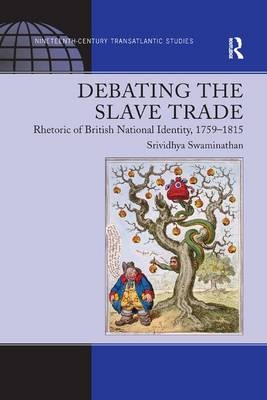
Debating the Slave Trade
Rhetoric of British National Identity, 1759–1815
Seiten
2016
Routledge (Verlag)
978-1-138-26210-2 (ISBN)
Routledge (Verlag)
978-1-138-26210-2 (ISBN)
How did the arguments developed in the debate to abolish the slave trade help to construct a British national identity and character in the late eighteenth century? Srividhya Swaminathan examines books, pamphlets, and literary works to trace the changes in rhetorical strategies utilized by both sides of the abolitionist debate. Framing them as competing narratives engaged in defining the nature of the Briton, Swaminathan reads the arguments of pro- and anti-abolitionists as a series of dialogues among diverse groups at the center and peripheries of the empire. Arguing that neither side emerged triumphant, Swaminathan suggests that the Briton who emerged from these debates represented a synthesis of arguments, and that the debates to abolish the slave trade are marked by rhetorical transformations defining the image of the Briton as one that led naturally to nineteenth-century imperialism and a sense of global superiority. Because the slave-trade debates were waged openly in print rather than behind the closed doors of Parliament, they exerted a singular influence on the British public. At their height, between 1788 and 1793, publications numbered in the hundreds, spanned every genre, and circulated throughout the empire. Among the voices represented are writers from both sides of the Atlantic in dialogue with one another, such as key African authors like Ignatius Sancho, Phillis Wheatley, and Olaudah Equiano; West India planters and merchants; and Quaker activist Anthony Benezet. Throughout, Swaminathan offers fresh and nuanced readings that eschew the view that the abolition of the slave trade was inevitable or that the ultimate defeat of pro-slavery advocates was absolute.
Srividhya Swaminathan is Associate Professor at Long Island University, Brooklyn Campus, USA.
Introduction; Chapter 1 Building a Common Vocabulary; Chapter 2 Converging Arguments in British Resistance; Chapter 3 Proliferating Antislavery Arguments and the Creation of an Activist Community, 1772–1789; Chapter 4 The Proslavery Rebuttal; Chapter 5 Whose Victory? Abolition and the Construction of British Identity, 1788–1807; Chapter 101 Epilogue Towards an Imperial Briton;
| Erscheinungsdatum | 08.01.2017 |
|---|---|
| Verlagsort | London |
| Sprache | englisch |
| Maße | 156 x 234 mm |
| Gewicht | 453 g |
| Themenwelt | Geschichte ► Allgemeine Geschichte ► Neuzeit (bis 1918) |
| Geschichte ► Teilgebiete der Geschichte ► Kulturgeschichte | |
| Geisteswissenschaften ► Sprach- / Literaturwissenschaft ► Anglistik / Amerikanistik | |
| Geisteswissenschaften ► Sprach- / Literaturwissenschaft ► Literaturgeschichte | |
| Geisteswissenschaften ► Sprach- / Literaturwissenschaft ► Literaturwissenschaft | |
| Sozialwissenschaften ► Kommunikation / Medien ► Kommunikationswissenschaft | |
| ISBN-10 | 1-138-26210-2 / 1138262102 |
| ISBN-13 | 978-1-138-26210-2 / 9781138262102 |
| Zustand | Neuware |
| Haben Sie eine Frage zum Produkt? |
Mehr entdecken
aus dem Bereich
aus dem Bereich
Europa 1848/49 und der Kampf für eine neue Welt
Buch | Hardcover (2023)
DVA (Verlag)
48,00 €
Giordano Bruno - ein ketzerisches Leben
Buch | Hardcover (2024)
C.H.Beck (Verlag)
29,90 €
die Fahrt der Bounty und die globale Wirtschaft im 18. Jahrhundert
Buch | Hardcover (2024)
Klett-Cotta (Verlag)
25,00 €


